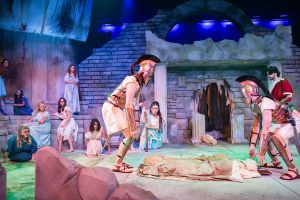Liberty University Theatre Arts Department Holds first showing of “The Trojan Women” March 21

The director stood alone surrounded beside the ruins of Troy in the stillness just before the performance started, his modern gray suit contrasting starkly with the surrounding set. The stage of the Black Box Theater had been transformed into a towering edifice of crumbling rubble and overturned pillars, the white banners of surrender stained with grime and splattered with blood were tattered and on the verge of unraveling.
The Liberty University Theatre Arts Department held its first showing of “The Trojan Women” on March 21 in the Black Box Theater, marking the first time Liberty has performed an ancient Greek play in over 20 years.
Picking up immediately where “The Iliad” left off, the play tells the story of the aftermath of the Trojan War. Exploring the fate of the surviving women who grappled with the deaths of their loved ones, the destruction of their home and the uncertainty of their fates, the play delves into the serious themes of suffering, war, fate and human frailty.
Written by Euripides during the Greek classical period, the play was first produced in 415 B.C. and featured themes of war and the devastating effects on civilian populations, which were particularly relevant in the middle of the decades-long Peloponnesian War.
“Theater from the world of classical Greece is in the very roots and beginnings of theater in the western world,” said the play’s director Associate Professor Neal Brasher. “I’ve been teaching theater history here for over 20 years now, and we talk a lot about ancient Greek plays, but we’ve never actually performed one during my time here, so I thought it was time to give our students an opportunity to do one of these plays and to give our audience a chance to see something that they don’t get to experience very often.”
Because of the unique conventions of classical Greek theater, this show will be a new experience for many viewers. Liberty’s production of “The Trojan Women” pays respect to the ancient Greeks by implementing some of their traditional acting styles, including line delivery and movement.
“Professor Brasher encouraged us to make the lines have a musicality to them. They’re sort of drawn out. Nothing’s rushed. It flows and is very lyrical,” said Daniel Arce, the actor portraying Poseidon. “With our movement, nothing is quick because that’s a very contemporary acting style. In this show, everything is slow and controlled.”
Though the genre and acting style of the play may be unfamiliar to some, the themes of loss, faith and human frailty are relatable. These themes are explored most poignantly through the character of Hecuba, queen of Troy, who lost most of her family and saw the destruction of her kingdom.
“Christians who have lost a family member or a close friend, they can relate to Hecuba, about how she’s struggling to find faith during this time of grief and loss,” said Samantha Glick, the actress who plays Hecuba.

Photo by Stephen Swiston
Hecuba mourns the loss of her kingdom throughout many moments in the play.
“Troy is a smoke, a dying flame, and together we weep for her,” Hecuba cries out in the play.
The women of Troy appear statuesque and skeletal with gold foil and dramatic black and white contouring smeared across their faces as they stand clad in Grecian dresses ragged with rips that reveal bruises and bloody scrapes. As an elderly character, Hecuba looks especially war-torn, leaning on her staff for support as she drags her weary body through the emotional wringer of the play. Despite this, she carries herself with the strength and dignity of a queen.
“It was a very challenging role to bring to life because she’s very physically weak but also trying to have a sense of dignity and trying to remain stoic,” Glick said. “She’s carrying the weight of the world on her shoulders, and she’s trying to be strong for the other women and for her remaining daughters, but it’s just so much.”
Audiences should come prepared to witness the tragedies of war and loss, yet Brasher hopes that audiences will ultimately gain a sense of empathy and compassion for people who may be walking through dark times.
“It’s important to remind us that human beings have always been human beings. It’s easy to look at classical Greek studies and see these people as almost marble statues and forget that they were real people just like us,” Brasher said. “We have very many things in common with people even on the other side of the world 2,400 years ago.”
The Trojan Women will continue to show from March 21-30. For more information on show times and to purchase a ticket, visit the Theatre Arts website at www.liberty.edu/arts/theatre/current-season.
Perez is a feature reporter for the Liberty Champion.
